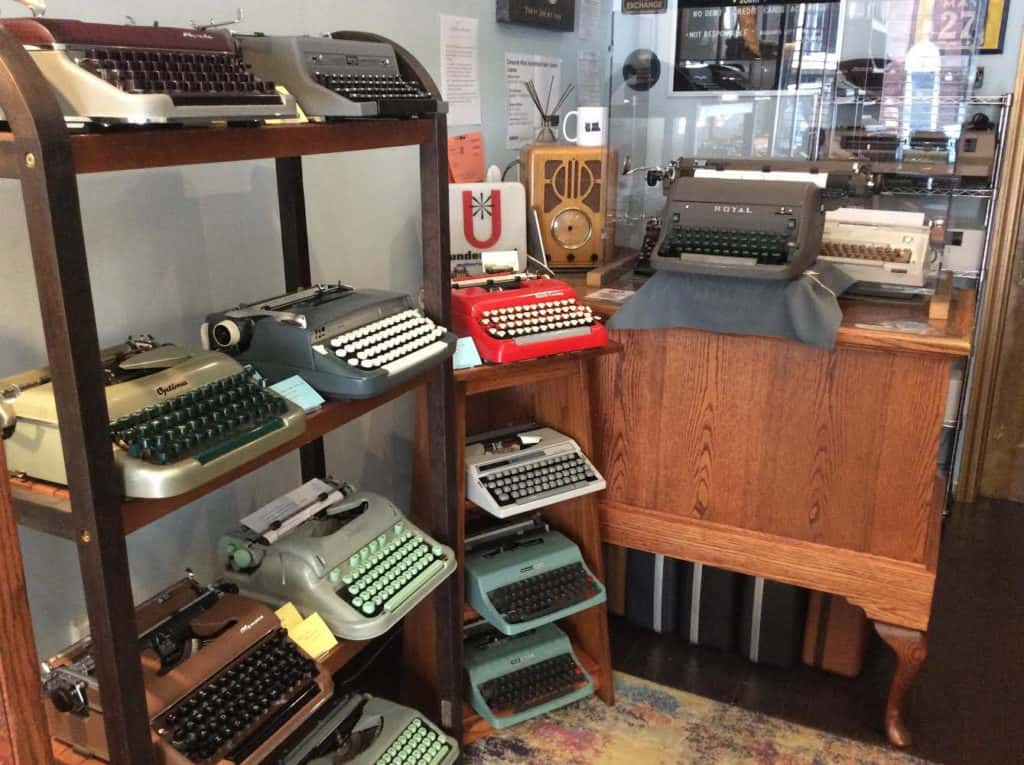
Gramercy Typewriter Company keeps the doors open for nearly nine decades.
By Foster Steinbeck

Since opening their doors during the Great Depression, the Manhattan-based typewriter sales and repair store, Gramercy Typewriter Company, has never had to worry about any power outages or system crashes affecting their bookkeeping or customer logs. That’s because the business largely doesn’t use computers or modern electronic software.
Instead, whether its keeping the books or recording customer information on index cards, they use old-fashioned typewriters.
“When my dad came into the business in 1959,” said third-generation owner Jay Schweitzer, “he watched and learned from his dad, and followed what he was doing and learned that way. Then I came along, and I’m watching and learning what my dad is doing and doing it that way. We’re still running the business the way it was done, ever since it started.”
While acknowledging computers would be faster and more efficient at taking care of the business’s backend needs, Schweitzer has no intention of changing, as there’s never been any problems with the way his grandfather started doing it in 1932.
After opening in an age where every business had a typewriter, and weathering several economic recessions and hard times, the family business is now one of the last typewriter stores in New York City. However, sales have increased as typewriters have become popular with more people (including many in Greenwich and one of their more famous and loyal customers, Tom Hanks).
Schweitzer said the business has stayed open because he, alongside his father, Paul, run it the same way their grandfather ran it — fixing and selling typewriters with an expert eye while attentively helping customers with their needs.
“There’s been so many changes going on around us in the last number of decades. Yet, we still stay true to what we’ve always done in that way,” Schweitzer said
Kicking it old school
When customers entered the store on 108 W 17th St, Schweitzer said he, his father (Paul) and part-time employees work with customers to weigh their options, such as helping match them with the best-suited typewriter for their writing purposes. They also help customers determine whether it was worthwhile to repair their old typewriters, or whether they should buy a new one.
“We don’t have to be salespeople, because these machines sell themselves,” Schweitzer said. “We’re just there to answer the question, point them in the right direction and the typewriter does the rest.”
“There is something very special about typing a letter or receiving a typed letter. You want to keep it and treasure it,” said Beth Barhydt, publisher of the Greenwich Sentinel. “We’re having my grandfather’s 1939 typewriter repaired so that I can use it to write letters and notes. It makes them more meaningful.”
“We’re the ones who recondition them from the bottom,” said Schweitzer. “We’re the ones that rebuilt them. Our hands were on them. [Customers] really get a birds-eye view of everything, top to bottom, about the machine … We don’t want them to leave until they have a full understanding of how that machine operates, so they can enjoy
the machine to the fullest by knowing and understanding all the mechanisms.”
Although closed on the weekends, those are the store’s busiest days, said Schweitzer, as he and his father spend all day in the workshop repairing and performing other maintenance work on customers’ typewriters.
Outside of part-time employees performing minimal repairs, the two Schweitzers perform the vast majority of the repairs and maintenance service due to their training and extensive experience. To become familiarized with the internal workings of different typewriters, makes, and models over several decades, the training takes years, Schweitzer said.

“We’re blessed because we’re able to put in that kind of hours and time and dedication, because, of course, it’s a job, and we’re trying to make a living, but we’re blessed because we really enjoy it and love the work,” he added
Long-time customer Michael Leslie first came into the store in the 1990s and was struck by how much it reminded him of his 1960s childhood in New York City, thanks to its small nature. Since then, Gramercy Typewriter has helped him buy and repair a half-dozen typewriters and Leslie remains good friends with Schweitzer.
Leslie said letters from typewriters can be “valuable artifacts,” and that he appreciates how the business has treated him.
“I just love that … they’re a third-generation business and they have survived all these decades through the advent of the computer, through 9/11, through [Hurricane] Sandy, and they’re still alive which is to me so remarkable and a testament to their consistency and their ‘stick-to-what-you-know’ philosophy,” said Leslie.
Weathering the storms
Abraham Schweitzer started the business by going door-to-door during the Great Depression, asking people if they needed help repairing their typewriters. After developing his clientele, Arnold bought some office space in the Gramercy District in Manhattan in 1932, the namesake for the business.
Needing more office space to conduct business and make repairs, Abraham upgraded to a new office space in the Flatiron district later that year. His son, Paul started working at the business in 1959, immediately after serving in the U.S. Navy. In 2018, the business moved its retail services to where it currently sits on 17th St.
“A lot of the other shops … kept wanting to gravitate towards the next big thing, whereas we always stayed true to how the business was started and developed a lot of clients around the city,” Schweitzer said.
In light of the COVID-19 pandemic, Schweitzer said the subsequent city-wide shutdown was financially difficult. However, he and his father used the time to catch up on the backlog of service orders.
Part-time employee Hudson McFann, who was hired four weeks before the shutdown began, said he used the time to set up the business’s Instagram page and polish its website. McFann started out as a customer who loved typewriters, saying he appreciates their durability and reliable nature.
“From my experience, especially now, spending more time in front of a screen, I think there’s something calming about using a typewriter,” he said. “You don’t have the distractions you have with digital devices.”
Although certainly capable, thanks to its customer base, Schweitzer said there are no plans to expand operations and grow bigger.
Out of concern the store might lose its close connection with its customers and its services and quality suffer, Schweitzer said the store will stick to what it knows best.
“If someone else’s hands are on the machine, and if someone else’s hands are dealing with customers, if someone else’s hands are answering the phone and communicating … we feel the business will suffer,” said Schweitzer. “We just like keeping it small, personable, so we can only give that type of service that people expect from us.”





